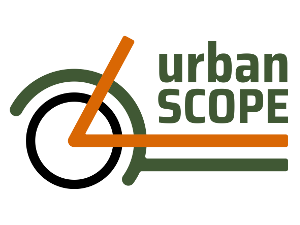The project aims to improve the quality of teaching in universities, by offering students a hands-on approach in the preparation of a SUMP for a locality in their cities, actively involving local communities and local authorities in the process. It also aims to bring the concept of SUMP closer to urban citizens, offering to them a learning package and tools to understand sustainable mobility better as well as exercise their public participation rights in the planning of sustainable mobility in their area.
The objectives of UrbanSCOPE include:
- To design an interdisciplinary learning environment for university students related to urban planning and design, with interactive links to local authorities and local communities, aiming to promote the concept of sustainable mobility.
- To extend these methodologies and tools to “family education” addressing mostly youth, their parents and other adults, and diffuse university learning innovations to the society more widely.
- To pilot-test, adapt and revise these innovative methodologies.
- To connect higher education to local communities, the civil society and local authorities, thus strengthening the role of higher education as a stakeholder in policy making with special reference to sustainable mobility.
- To change attitudes and behaviours of city inhabitants in favour of sustainable mobility, and to promote active citizenship, by proposing interactive mechanisms for public participation.
- To contribute to the creation of sustainable mobility scenarios in the participating cities, serving as a basis for future Sustainable Urban Mobility Plans.
The activities lead directly to 6 tangible outputs of the project:
1) Carrying out a local sustainable mobility audit in 3 EU countries, focusing on the mobility behavior and attitudes of citizens, addressing the needs of local authorities and educational institutions.
2) Creating an Action Plan per city, developing alternative SUMP scenarios, and involving the local communities in the process.
3) Devise a learning methodology and ICT tools for an integrated approach to SUMP.
4) Pilot-test and revise the learning methodology with university students and with secondary school students and adults.
5) Widening the methodology and tools of UrbanSCOPE through a public competition, providing core material (ideas and scenarios) for local planning.
6) Prepare and publish a Handbook for users of the UrbanSCOPE methodology.
The project implementation methods will include desk research and field surveys in 3 EU countries; dissemination and publicity campaigns and competitions led by local authorities and civil society organizations, including 4 national workshops and an international conference; the construction of education tools and methodologies based on the technologies of location-based games and augmented reality; the adaptation and pilot-testing of these tools to the needs of higher education and secondary schools/family education; the dissemination of the devised learning tools and methodologies by making them available for free, and accompany them with a Handbook. Intangible results include the changing attitudes and perceptions towards sustainable urban mobility, the awareness raising of citizens towards a more sustainable use of urban transport, and the opportunities to widen the participative planning and citizen engagement methods.
The target groups of the project include higher education institutions, secondary education institutions, urban citizens, civil society organisations, planners and policy makers at local level. These groups are expected to benefit directly from the UrbanSCOPE methodology and tools, as being end-users of the developed products.
The project benefits greatly by its transnational character, which allows the national teams to compare data, benefit from the exchange of best practice, complement each other in terms of expertise and previous experience, and create education and awareness raising tools that would have a wide application across nations and cultures.
